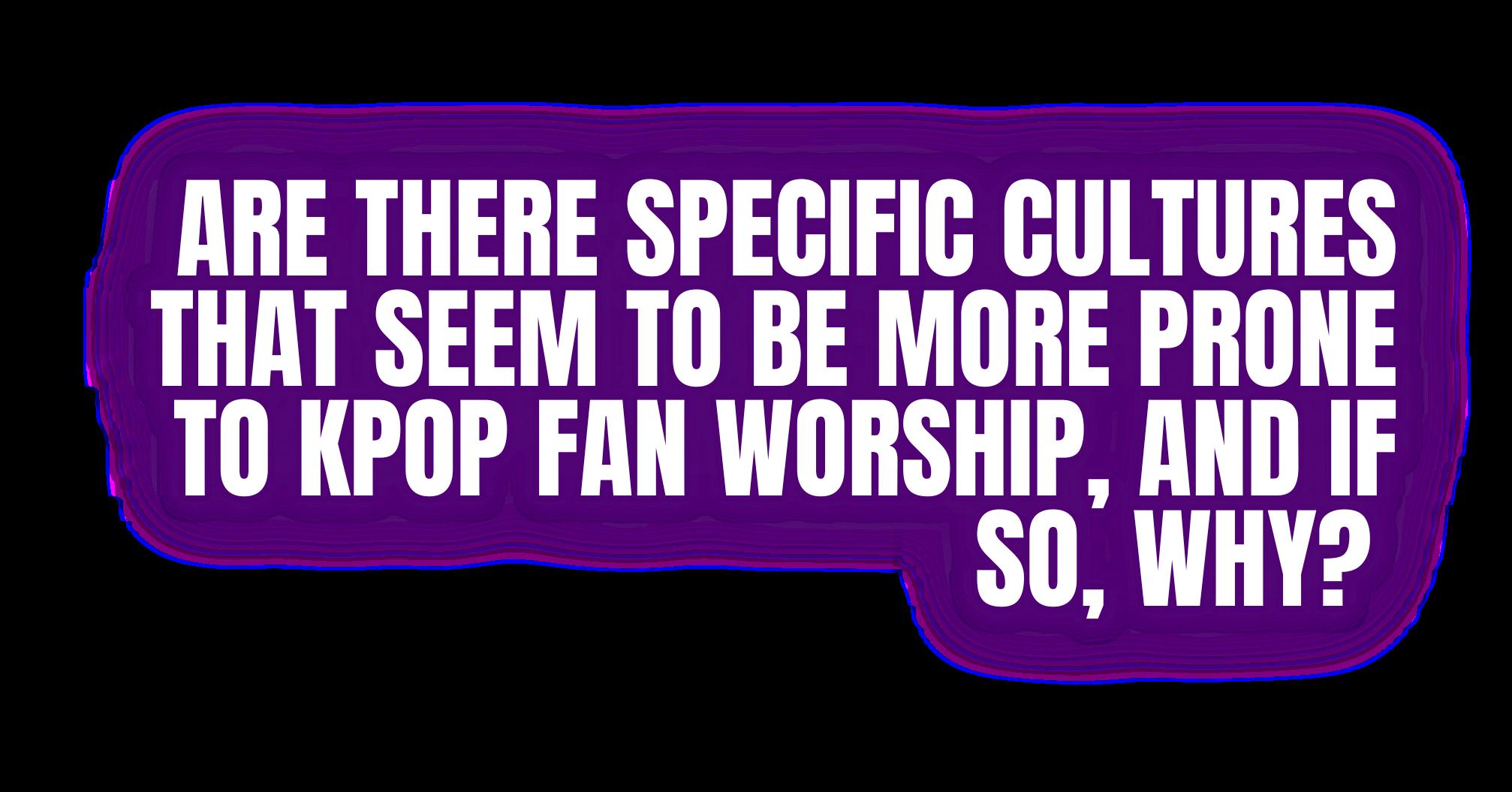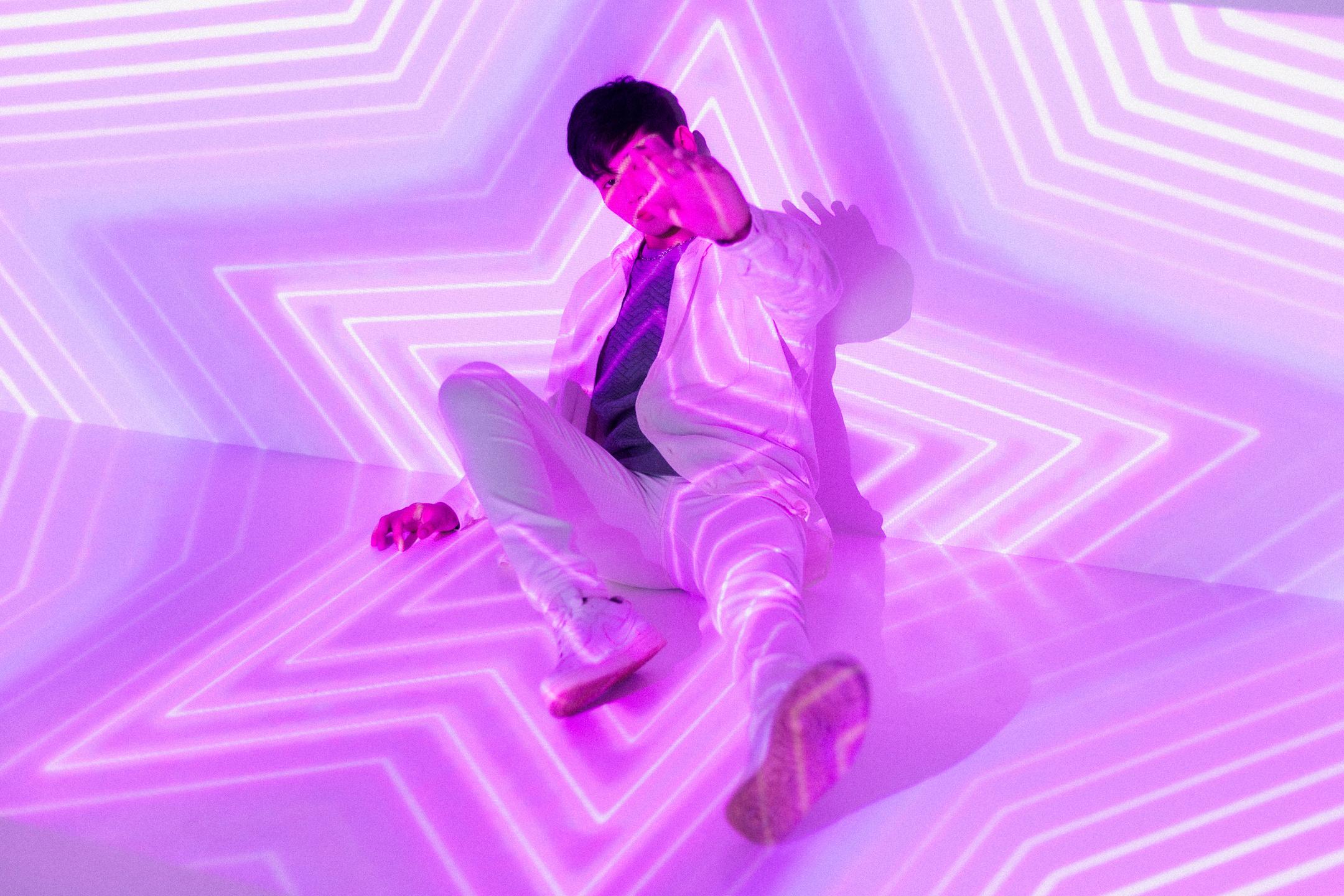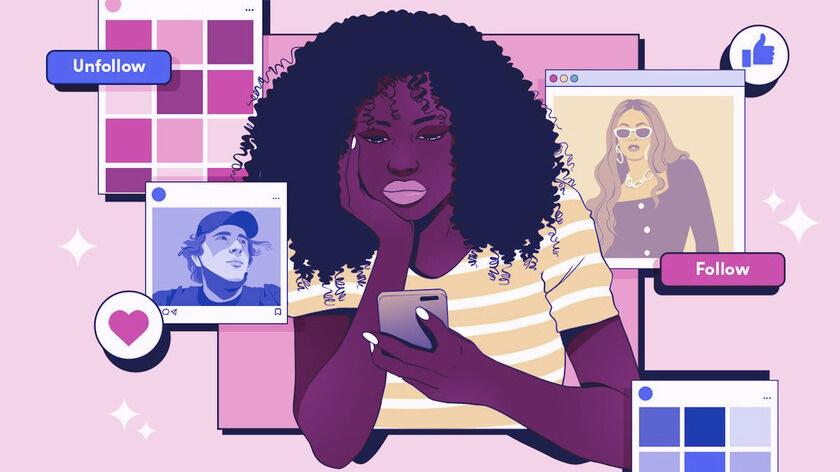blurb 23 20



Issue 15 | oct
Music Rhythms and Heartbeats: A
Rhythmical Essay on Music and Wellbeing

Are there specific cultures that seem to be more prone to Kpop fan worship, and if so, why?

Parasocial Relationships
Exploring Escapism: Fan Obsession's Impact on Self
K-pop Idol Loyalty and Its Influence on Romantic Expectations
1 9 4 15 5 7
Editor-in-Chief
Creative Designer Writers


Artists
Anthra
Srivani Karthikeyan
Nancy Singh
Ankita D'silva
Aditya Thite
Bhoomika Shibu
Zaida Jafar
Malavika Muralikrishnan
Christine R Binu
Nabiha Tahsin Unaishah
Adah Inaya Shaheer
Halimah Smaeer
2
MUSIC RHYTHMS AND HEARTBEATS: A RHYTHMICAL ESSAY ON MUSIC AND WELLBEING
Music is like a magical friend that can make us feel all sorts of things and even help our bodies stay healthy. The beat in music, called rhythm, is like our heart's rhythm, and when they match, it can make us feel even more connected to the music.
Imagine how music can make you feel happy, sad, or pumped up when you're doing something. It's like having a buddy who understands your feelings, no matter what. When you're having a slow and relaxed day, music can help you chill out and let go of stress. But when you need to be active and focused, it can give you a boost of energy, like a superpower for your brain.
Sometimes, when we're feeling down or things aren't going well, music can be like a ray of sunshine. It can lift our spirits and give us hope, reminding us that better days are ahead. It's like a comforting hug for our emotions when we need it the most.
Music can do lots of things for us; it can make us feel like we belong to a group, help us tell others how we feel when words don't quite cut it, and even let us daydream and escape to different places and times, all within the span of a few notes.
No matter how we're feeling or what's going on in our lives, there's always a piece of music that can make us feel better. Music is a special gift that's there for us, like a good friend, whenever we need it. It's a language that everyone understands, and it has the power to make our lives richer and more colorful.
-Nancy
Singh
As we are edging towards the quarter of the new century, we have seen a new theme attached to the functionality of this decade. The theme of “Globalization” in the 21st century has shaped an influx of remarkable linkages between political, economic, social, and intercultural aspects (Sousa Santos, 2006). The most noticeable defining factor has been the spread of entertainment across different consumers across the globe connecting different audiences through the lens of the internet. The consumption of Korean culture not limited to music has flared across the world by wildfire.
With Fan worship comes a set of strong psychological factors attached to emotional and cognitive biases which are favored towards their famous personalities (Gong and Huang, 2022). The presence of multiple psychosocial factors has been influencing factors for fan worship and these might be interlinked to cultural values, social identity and connections, escapism, and a sense of belonging (Laffan, 2020).

As far as the demographics go, the Asian community is the largest and dominant fanbase for K-pop with Asian countries such as Indonesia, Japan, China, Philippines, Malaysia etc. Although a good community exists within the Middle East that has also shown growth over the past few years.


A good reason for this is the cultural values exhibited that are relatable to a general viewer within the Middle East these include strong character building and relationships that fit into the mainstream success of K-pop (Elaskary, 2018). Furthermore, fandoms within East Asia are more prone to be subject to fan worship as there has been a great increase in as many lines up to support their respective K-pop idols or idol groups as they are more commonly called.
The rationale for the increased fan worship within the East-Asia/ Asian community stems from the reason why they are fans in the first place. Asian cultures have a deep sense of relatability towards their Korean idols which cannot be seen in other continents. As research conducted in the past has showcased an interlink between Korean culture to Confucius heritage, China, Japan, Hong Kong, and Taiwan rank high in K-pop fandoms (Gupta et al., 2002) One cannot disregard the cultural importance presented by the Koreans. The industry
The rationale for the increased fan worship within the East-Asia/ Asian community stems from the reason why they are fans in the first place. Asian cultures have a deep sense of relatability towards their Korean idols which cannot be seen in other continents. As research conducted in the past has showcased an interlink between Korean culture to Confucius heritage, China, Japan, Hong Kong, and Taiwan rank high in K-pop fandoms (Gupta et al., 2002) One cannot disregard the cultural importance presented by the Koreans. The industry contributes interest to cultural variety and "hybridization," in which two cultures are combined to form a dynamic culture since it is something unfamiliar and intriguing that caught viewers' attention as K-pop grew (Messerlin and Shin, 2017).
To conclude, there exists a positive relationship between specific cultures adhering to Kpop fan worship. This is primarily observed in East Asia, although there is an expanding global community. Due to the many distinct cultural phenomena mentioned above, various factors ultimately affect and attract fan worship. However, as other cultures might be able to direct their interests toward Korean culture, the outlook may alter
-Aditya Thite
psychological impacts do they have?
“Parasocial relationships” (Horton & Wohl, 1956) refers to intimate relationships between audiences and celebrities. Parasocial relationships arise when individuals are repeatedly exposed to a media persona, and the individuals develop a sense of intimacy, perceived friendship, and identification with the celebrity (Horton & Wohl, 1956). In such kinds of relationships, fans often tend to devote their time, energy, and emotions to a person who isn’t even aware of the other’s existence (Cohen, 2001).
These relationships develop through repeated exposure to the media figure, often through television shows, movies, social media platforms, or other forms of entertainment. Over time, individuals begin to form an attachment and develop a sense of familiarity with the media figure, despite the lack of direct interaction (Cohen, 2001)


Although parasocial relationships exist in all entertainment industries (such as with actors, athletes, or even YouTubers), it is observed to be more prevalent in K-pop (Chung, 2017). This can be accounted for by several reasons such as accessibility and engagement with the idols and content, unique fan culture, various multimedia content (not just limited to music), intensive promotions, and idealization of the idols to name a few. With so much content at hand designed specifically to feed into the delusions of the fans, it becomes easy to develop a deep sense of connection with the artists/idols
The development of parasocial relationships can be attributed to several factors. Firstly, the presence of a media figure in a person's life on a regular basis creates a sense of "social presence" and familiarity. This constant exposure to the leads individuals to perceive a sense of intimacy and connection (Zajonc, 1968). Secondly, since idols are so carefully crafted by their companies to be relatable to their fans, it is easier for fans to identify themselves with the idol through shared interests or personality traits

“Moreover, due to the number of social media platforms available to interact oneon-one with idols such as personal messages, face-to-face fan meetings, etc., it is easier to strengthen the parasocial bonds that already exist. How do parasocial relationships affect someone psychologically? The impact such perceptions have on people can vary from person to person. It tends to set unrealistic expectations for their real-life relationships, often leading to disappointment and dissatisfaction (Cohen, 2001). Excessive identification with celebrities can lead to a person losing their sense of self, simultaneously increasing the dependence on such kinds of relationships for emotional support and happiness (Cohen, 2001) In extreme cases, individuals who invest too much emotionally in parasocial relationships are more prone to experience emotional distress, depression, anxiety, etc. when deprived of it in any way.
However, it is interesting to note that the one-sided nature of these relationships doesn’t necessarily make them negative or harmful. On a positive note, such relationships can provide a sense of belonging and connection, especially for individuals who may feel isolated or lonely in their everyday lives (Horton & Wohl, 1956). It can also provide a temporary escape from reality and serve as a form of entertainment and inspiration (Rubin, 2002). Watching or reading about their favourite celebrities, has also proven to boost mood and provide a sense of happiness and enjoyment to fans.

Another perspective to view parasocial relationships, which is often overlooked, is the impact these have on the artists themselves. While the intensity and nature of the effects these relationships have on idols can vary widely depending on the individual itself, some of the ways in which they can be impacted include increased pressure to maintain a certain image(Giles and Maltby, 2004), concerns regarding loss of privacy due to the overwhelming amount of intrusion into their private lives (Baker, 2014), exacerbated mental health issues, and maintaining real-life relationships etc.
Parasocial relationships are common in the realm of the entertainment and media and can vary in intensity. They are not inherently negative and can provide entertainment, inspiration, or a sense of belonging. Thus, it is important for individuals to maintain a healthy balance between their parasocial relationships and their real-life relationships.
-Malavika Muralikrishnan
"Body Dysmorphia's Impact on K-pop Fan Culture and Self-Image"

WhatroledoesbodydysmorphiaplayintheK-pop fanculture,andhowdoesitimpactfans'self-image?
Body dysmorphia (BDD) is a mental health condition, in which an individual constantly worries about one’s own appearance and any perceived faults that affect their body. BDD is most commonly seen in the younger populace, more precisely teenagers and young adults (Bjornsson, 2013), which is a time when individuals may feel most particular about their body shape and look. Body dysmorphia has increased rapidly in the modern era, and has seen a rise, especially in the Korean population of adolescents (Mi-Yeul Hyun, 2014), which may be a result of having extreme societal beauty standards, prioritizing having a slim body and v-shaped face to encapsulate an ‘innocent look’. Beauty standards have always been a high fixation in Korea and have risen even more so once K-pop started to increase in popularity.

K-pop’s influence on media has been massive, more specifically from 2015 onwards, which has led to a change in the music that youngsters consume. Many Korean idols are pressured to follow societal beauty norms to appeal to audiences; more commonly seen in female K-pop idols, as they turn towards dramatic weight losses, extreme diets, and constant ‘fitness goals’ to maintain their figure. This leads to fans trying to follow said routines, in order to ‘be like their idol’. Some such examples can be seen in fans trying to follow Le Sserafim’s workout routine, and practice the ‘IU
diet’; further increasing chances of BDD occurring, as individuals get frustrated when results are not immediately seen, or not resembling their idol’s body type; which can lead to severe health problems, such as bulimia, depression, and eating disorders.
(Milligan, 2022) . Many K-pop companies tend to focus on appearances, especially when recruiting and scouting potential members to debut.
This encourages fans in leading unhealthy lifestyles of severe diets and unhealthy exercise to get ‘scouted’, in the hopes of potentially getting chosen to debut like their idols. The recurring trend of survival shows such as I-LAND has further led to this fascination, as many youngsters train desperately to try and secure a spot in said shows. Furthermore, skincare has rapidly increased in popularity, with individuals spending hundreds to thousands of currency to invest in ‘Korean skincare’, following numerous tutorials and guides to achieve ‘Korean glass skin’, which is supposedly ‘guaranteed to work’ and ensure that users get idol-like skin. Blemishes and acne are very rarely seen on Korean idols, subjugating a belief that fans can achieve perfect skin by simply following their idol’s face care routine!
The desire to look like K-pop idols goes so far, that some fans get plastic surgery to alter their features to fit into Korean beauty norms. Such is the case with Oli London, a K-pop fan who got surgery to try and resemble BTS’s Park Jimin, and change his Eurocentric features to Korean ones.
Whilst K-pop has provided us with an abundance of creativity, imagination, and concepts, it has simultaneously unraveled a darker side of fan worship, as the beauty standards and norms it provides can create unwarranted side effects, including body dysmorphia, and other complications that follow as a result of the mental health disorder. As such, K-pop may encourage many unhealthy habits, which can be extremely detrimental in the long run to both fans and idols, as it normalizes the idea that beauty equals pain.

-Bhooomika Shibu
A r t b y C h r i s t i n e R B i n u

A r t b y N a b i h a T U n a i s h a h
EXPLORING ESCAPISM: FAN

OBSESSION'S IMPACT ON SELF
For many K-pop fans (including myself), our journey into this magical realm began from pure curiosity, a desire to try something new, and maybe just a tad of FOMO. Some of us may have remained casual listeners of the genre whereas others took an interest in the glitz, glamour, and gossip in the industry and are deeply invested in what’s happening with their biases and ult groups (basically the person or a group a fan favors the most).
Sometimes K-pop fans can form a social identity through the groups or fandoms they belong to, which can affect their self-concept. A psychological concept that explains this is Social Identity (Tajfel, 1974) which states that parts of our identity or selfconcept can be explained through our membership
in groups, creating emotional significance attached to our groups. A study has shown that participants with higher fanship levels were also predicted to have increased psychosocial outcomes like feelings of social connectedness, self-esteem, and even happiness. One possible reason is that K-pop gives fans a sense of belonging to those who stan the same idols or groups (Laffan, 2021). Now, that’s a great argument for being a K-pop stan in my opinion.

While there’s nothing wrong with this, things can take a turn when fans drive it to the point of obsession that takes over other aspects of their lives. I’m not talking about the sasaengs (fans that may stalk or violate a K-pop idol’s privacy) in the room, but it is common to use music, no matter the genre, as a coping mechanism or a form of escapism. While we may not like to admit it, K-pop is not exempt from this. Music is an effective stress buster but can be used in maladaptive ways, leading to avoidance coping, worsening of moods despite our intention to improve them, and socially isolating yourself, which harms our mental health (Silverman, 2021). Research shows that adolescents who tended to use music unhealthily, resulting in behaviours like those listed above, were likely to have negative psychological wellbeing (Saarikallio et al., 2015).


Fan obsession behaviors have also been known to take a darker turn which can lead to instances of celebrity stalking which may be the result of fans wanting to form closer associations with their idols (Wong et al., 2023). However, I have enough faith in humanity that I’m choosing to believe that not every so-called “obsessed” K-pop fan is resorting to stalking, but that’s not the only way it can be detrimental to our lives
A study of sports fans showed that a higher level of compulsive consumption was related to negative behavioural measures like using sports to cope with negative situations in their lives and neglecting important obligations (Aiken et al., 2018). Kpop idols appear in almost all forms of media, making it very easy for fans to become attached and to use this to ignore unpleasant realities. An argument can be made that the amount of time and resources we invest into our fandoms can impact our academic performance (e.g., procrastinating doing our coursework by watching the latest episode of our favorite variety show...we all know it won’t just be one episode) and impair our emotional and identity development (Nur Ayuni Mohd & Nur Hafeeza Ahmad, 2020).
All in all, there’s no issue with using Music and K-pop to cope with something that’s bothering us, but when that use starts negatively interfering with our life is when we should be taking a step back and trying to find a healthier way to handle our emotions and feelings.
-Ankita D’ Silva
K-pop Idol Loyalty and Its K-pop Idol Loyalty and Its Influence on Romantic Influence on Romantic Expectations Expectations
K-Pop, or Korean pop music, has swept the globe, attracting millions of fans with its addictive tunes, outstanding choreography, and charming idols. KPop's reach extends far beyond music; it has evolved into a cultural phenomenon that influences fans lives in a variety of ways. One fascinating facet of this influence is how intense fan loyalty to K-Pop idols might influence people's expectations of future romantic partners.
The majority of research on the positive aspects of fandom has concentrated on 'fandoms' and relationships with other fans, demonstrating that this can have a positive influence in terms of identification, belongingness, and psychological advantages (Gabriel and Young 2011; Obst et al. 2002).
Individuals who are strongly involved in K-Pop fandoms may have unreasonable expectations for their romantic partners due to idols' idealized images. Furthermore, fans' emotional investment in idols may influence their emotional availability and attachment types in romantic relationships (Maltby et al., 2004). Therefore, it is possible that K-Pop fandom can have an impact on future love relationships.
The study's findings indicate a link between intense personal celebrity worship and poorer mental health, especially when linked to neuroticism and disengagement coping mechanisms. Similarly, K-Pop fans who have a strong attachment to idols may face mental health changes due to variables such as the perceived bond with idols, online fandom drama, or excessive expectations (Maltby et al., 2004).

Art by Christine R Binu
Excessively high expectations of one's partner might lead to various relationship problems. When people compare their significant other to the idealized image of a Kpop idol, they unintentionally set unreasonably high demands. These expectations can cause discontent, disappointment, and irritation in a relationship (Brooks, 2018).

The fervour and commitment of K-Pop fans is unparalleled. Fans frequently create strong emotional bonds with their idols, closely following their jobs, personalities, and even personal lives. These fans, termed "stans," demonstrate a feeling of commitment and dedication that extends beyond casual fandom. Admiration, emotional investment, and even a sense of ownership characterizes the idol-fan relationship. A strong connection to KPop idols can surely influence one's perspective on romantic relationships.
-Zaida Jaffar
Art by Halimah Sameer
I truly hope you enjoyed everything you read and got the opportunity to learn something new as well. I am writing to share a personal journey that has profoundly influenced my perspective on the theme of our latest issue: "Celebrity Worship and Its Psychological Effects." I hope that this narrative will offer a unique insight into the subject and provide a relatable angle for our readers.

As an editor deeply immersed in the field of psychology, I've always been intrigued by the intricate ways in which fandoms can shape our lives. In this regard, my personal experience as a member of the BTS Army, the dedicated fanbase of the South Korean boyband BTS, has been a transformative force in my life. My journey with BTS began like that of many fans: I stumbled upon their music and was immediately captivated by their talent, authenticity, and messages of self-love and resilience. Little did I know that this fascination would evolve into a life-altering connection.
Being a part of the BTS Army is more than just supporting a musical act; it's about embracing a global community that transcends cultural and linguistic barriers. It's about sharing in the joys and sorrows of life with people from diverse backgrounds, all bound together by a common love for the band. Through this journey, I've learned several invaluable lessons. First and foremost, the sense of belonging and support within the BTS Army is unparalleled. It's a reminder that, even in our increasingly interconnected yet often isolating world, we can find solace and companionship in unexpected places.
,
Moreover, my involvement with BTS has fueled my creativity. The band's emphasis on self-expression has inspired me to explore my own artistic side, whether through fan art, creative writing, or the pursuit of new hobbies. This creative outlet has been essential for my mental well-being. Perhaps most importantly, BTS's message of self-acceptance and personal growth has encouraged me to embark on a journey of self-discovery and self-improvement. Their emphasis on resilience and self-love has motivated me to face challenges with a more positive and proactive mindset.
As the Editor-in-Chief of our magazine, I am excited to share this personal narrative with our readers. My experience as a dedicated member of the BTS Army offers a unique perspective highlighting the transformative power of fandoms in shaping our identities, fostering creativity, and encouraging personal growth. I look forward to contributing much more in our upcoming issue and hope that our readers will find resonance in the experiences and insights I've shared. Thank you for your continued support in making our magazine a platform for thought-provoking discussions on topics such as these.
Best regards,
Anthra Devi Editor-in-Chief [blurb.]
REFERENCES
Aiken, K. D., Bee, C., & Walker, N. (2018). From passion to obsession: Development and validation of a scale to measure compulsive sport consumption. Journal of business research, 87, 69-79.
https://doi.org/10.1016/j.jbusres.2018.02.019
Baker, S. (2014). Celebrities, fans, and parasocial interaction: A review of the literature. Psychology & Marketing, 31(11), 959-972.
Chung, S., & Cho, H. (2017). Fostering Parasocial Relationships with Celebrities on Social Media: Implications for Celebrity Endorsement.Psychology & Marketing,34(4), 481-495.
Cohen, J (2001). Parasocial break-up from favourite television characters: The role of attachment styles and relationship intensity. Journal of Social and Personal Relationships, 18(4), 187-202.
De Sousa Santos, B. (2006). Globalizations. Theory, Culture & Society 23 (2-3), 393- 399.
https://doi-org.ezproxy1.hw.ac.uk/10.1177/026327640602300268

Elaskary, M. (2018). The Korean Wave in the Middle East: Past and Present. J. Open Innovation, Technology, Market and Complexities, 2018, 4 (4), 2-16.
https://doi.org/10.3390/joitmc4040051
Giles, D. C., & Maltby, J. (2004). The role of media figures in adolescent development: Relations between autonomy, attachment, and interest in celebrities. Personality and Individual Differences, 36(4), 813-822.
Gong, A., & Huang, Y. (2022). When young female fans were producing celebrities: The influential factors related to online fan engagement, celebrity worship, and program commitment in idol-nurturing reality shows. Frontiers in Communication, 7.
https://doi.org/10.3389/fcomm.2022.931185
Gupta, V., Hanges, P. J., & Dorfman, P. (2002). Cultural clusters: Methodology and findings. Journal of World Business, 37(1), 11-15.
https://doi.org/10.1016/S1090-9516(01)00070-0
Aiken, K. D., Bee, C., & Walker, N. (2018). From passion to obsession: Development and validation of a scale to measure compulsive sport consumption. Journal of business research, 87, 69-79.
https://doi.org/10.1016/j.jbusres.2018.02.019
Baker, S. (2014). Celebrities, fans, and parasocial interaction: A review of the literature. Psychology & Marketing, 31(11), 959-972.
Chung, S., & Cho, H. (2017). Fostering Parasocial Relationships with Celebrities on Social Media: Implications for Celebrity Endorsement.Psychology & Marketing,34(4), 481-495.

Cohen, J (2001). Parasocial break-up from favourite television characters: The role of attachment styles and relationship intensity. Journal of Social and Personal Relationships, 18(4), 187-202.
De Sousa Santos, B. (2006). Globalizations. Theory, Culture & Society 23 (2-3), 393- 399. https://doiorg.ezproxy1.hw.ac.uk/10.1177/026327640602300268
Elaskary, M. (2018). The Korean Wave in the Middle East: Past and Present. J. Open Innovation, Technology, Market and Complexities, 2018, 4 (4), 2-16.
https://doi.org/10.3390/joitmc4040051
Giles, D. C., & Maltby, J. (2004). The role of media figures in adolescent development: Relations between autonomy, attachment, and interest in celebrities. Personality and Individual Differences, 36(4), 813-822.
Gong, A., & Huang, Y. (2022). When young female fans were producing celebrities: The influential factors related to online fan engagement, celebrity worship, and program commitment in idol-nurturing reality shows. Frontiers in Communication, 7.
https://doi.org/10.3389/fcomm.2022.931185
Gupta, V., Hanges, P. J., & Dorfman, P. (2002). Cultural clusters: Methodology and findings. Journal of World Business, 37(1), 11-15.
https://doi.org/10.1016/S1090-9516(01)00070-0


























